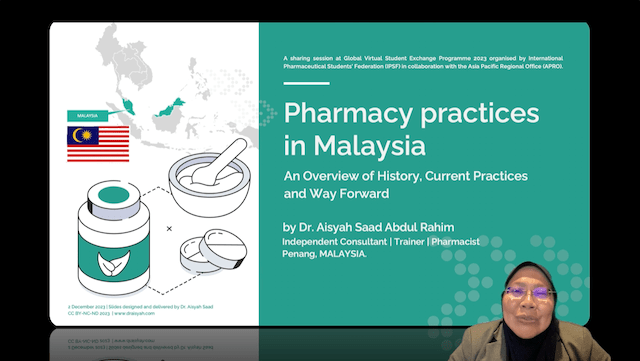Recently I was invited to deliver a talk on pharmacy practices in Malaysia by Malaysian Pharmacy Students’ Association (MyPSA). Although my key expertise is not really in the field of pharmacy practice per se, I embarked into my professional journey as a pharmacist in Malaysia more than 25 years ago.
I thought I could contribute by presenting my worldview (definition) of the pharmacy practices in my beloved country to the international students.
So I said: Yes, why not… =)
The Global SEP programme was organised by organized by the International Pharmaceutical Students’ Federation (IPSF) in collaboration with the Asia Pacific Regional Office (APRO). Mainly led by Pharmacy Students’ Association of Thailand (PSAT), the invite came from MyPSA.
Pharmacy practices in Malaysia
Pharmacy practices in Malaysia encompass services offered by pharmacists in hospitals and community / retail. It also includes the drug manufacturing and production the pharmaceutical industries.
With growing population in the urban and rural areas, the need for efficient and effective pharmaceutical services in Malaysia came about along with the increased number of hospitals and health clinics to address the healthcare in Malaysia [1,2].
The intense tin mining activites in Taiping in the 1800-early 1900 led to the establishment of Taiping General Hospital. It was the first hospital in Malaya under the British administration – primarily set up to care for tin mining workers.
Taiping General Hospital later became the model for other hospitals in Malaysia.
Pharmacy practices in Malaysia: An overview of History, Current Practices and Way Forward
In my talk, I provided an overview of the brief history of Malaysia to the international audience as a background information to the diverse multiracial society that we have here.

With the diverse cultures, traditions, medicines and practices, of course, I highlighted that we are blessed with a wide variety of delicious food and delicacies!
Uniquely Malaysia, I would say.
In general, pharmacy practices in Malaysia can be categorised into three distinct professional areas: hospitals and health clinics (public and private), pharmaceutical companies and community pharmacy.
Pharmacy practices in Malaysia: Dispensing separation to promote improved population health
While there are some growth and extended pharmacist roles in hospital pharmacies and pharma industries, I gathered that the professional roles of community pharmacists remain limited and relatively stagnant thanks to having no dispensing separation policy.
The recent Malaysia’s Health White Paper (HWP) envisioned that the nation’s healthcare transformations to a person-centred system that would support preventive services and promote wellness in the population.
Promoting wellness in the population, not only by visiting hospitals or clinics but also via proper digital platforms. The rapid spread of fake news, misinformation and disinformation are alarming in the age of social media and artificial intelligence, especially when fall into the wrong hands e.g. vaccines and antimicrobials.

Having a dispensing separation policy in place reduces medical costs, and empowers invidual patients with information from trusted healthcare professionals. It is hoped that this way forward would put pharmacists in the crucial frontline role in the community.
Apart from the modern medicines that is currently dominating the healthcare systems in Malaysia and other countries, the integration of traditional and complementary medicines (TCM) into the existing healthcare system is gaining traction in Malaysia [3,4].
Well, that’s my take on pharmacy practices in Malaysia in the post-pandemic era.
References:
1. Hassali, M. A. A., Shafie, A. A., See, O. G., & Wong, Z. Y. (2016). Pharmacy practice in Malaysia. In Pharmacy Practice in Developing Countries (pp. 23-40). Academic Press.
2. Health Facts 2022, Health Informatics Centre, Planning Divisions, Ministry of Health.
3. Park, J. E., Yi, J., & Kwon, O. (2022). Twenty years of traditional and complementary medicine regulation and its impact in Malaysia: achievements and policy lessons. BMC health services research, 22(1), 1-13.
4. Malaysian National Medicines Policy, 4th edition.


